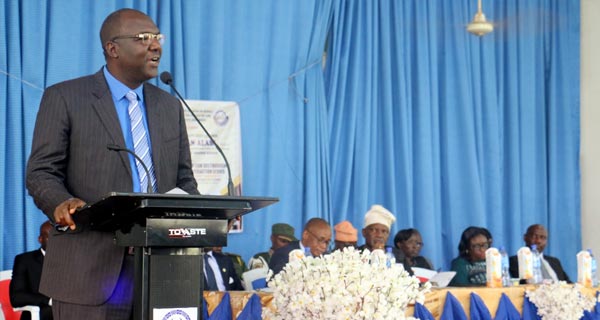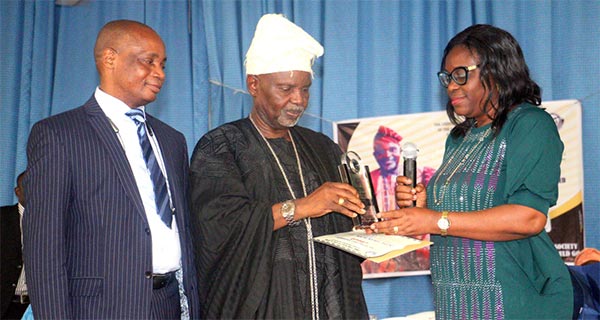The Faculty of Law, on Friday, 2nd August, 2019 held its maiden edition of “Distinguished Personality Interactive Session” at the Otunba Gbenga Daniel Hall on the Main Campus, Ago-Iwoye, where a veteran journalist, public relations consultant, author and motivational speaker, the Agba Akin Olubadan of Ibadan Land, Oloye Lekan Alabi, delivered a lecture entitled “Perception of Lawyers in the Society and The Way Legal Education Should Go”.

Welcoming guests to the occasion, the Dean, Faculty of Law, Professor Charles. O. Adekoya, who was full of gratitude to the Vice-Chancellor and his Management team for their unflinching supports to the Faculty at all times, disclosed that the Distinguished Personality Interactive Session became imperative, not only to motivate and enrich the Law students outside the four walls of the classrooms, but to also take the University back to the society for enhanced town and gown relationship. He noted that the choice of the guest lecturer was a well thought-out decision considering his pedigree and personality in both public and private life. According to him, Oloye Lekan Alabi was not only a motivational speaker, author, but a veteran journalist who had read, documented, and presented over time, different perceptions about lawyers in the society with recommendations where necessary.

In his opening speech as the Chairman of the occasion, the Vice-Chancellor, Prof. Ganiyu Olatunji Olatunde, who was represented by the Deputy Vice-Chancellor, (Academic), Prof. Deji Agboola gave an insight into the evolution of the University which, he said was established in 1982 with the first set of students admitted numbering 500 in January 1983. He disclosed that the University had grown in leaps and bounds and now housed over 24,000 students, 70 programmes spread across 54 departments, 13 faculties, and three Colleges. He emphasized that about 99 percent of the programmes had NUC accreditation. Prof. Olatunde who equally attested to the quality of the graduates being produced in terms of learning and character noted that the Law Faculty was not an exemption as exemplified by five OOU Law graduates who distinguished themselves with first class grade at the last call-to-bar examinations in the Law School.
He remarked that the University was equally enhancing the quality of its products with the provision of additional core values of education, employability, and entrepreneurship being supported by special grant from the British Council for further collaboration with Swansea University, Wales in the United Kingdom. While noting that the interactive session had come at the right time when the University was engrossed in programmes for staff and students development, community relations, and students’ re-orientation against social vices, especially, suicide. The Vice-Chancellor stated that the topic of the lecture was not only relevant but appropriate in arriving at ways out of contemporary issues in the public and private life as it revolves around legal actions. The University’s helmsman, however, noted that “whatever an individual does in life, one can make it in life whether he or she is perceived well or not, as there is more to life”.
Delivering his lecture, Oloye Lekan Alabi described his invitation as a guest lecturer at the maiden interactive session of the Faculty of Law, as more of divine than happenstance, considering his relationship with his senior in the pen profession, Late Chief Victor Olabisi Onabanjo, after whom the University was named. He began his discussion on the subject matter with emphasis on the Use of Injunctions in Electoral Disputes and Abuse of Legal Jargons in Brief Writing by Lawyers. He sees injunctions as preservative reliefs designed to maintain the status-quo between parties pending the final determination of the suit or pending a certain date.
Speaking further, the guest lecturer, who also saw his presentation as having a flavour of pre-destiny owing to the fact that three of his children were Law graduates, acknowledged the fact that electoral litigation had become an inevitable part of the electoral process in Nigeria. This, he said was the responsibility of the judiciary aimed at resolving the disputes arising from the electoral process superintended by the Independent National Electoral Commission.
While reviewing the attitude of the courts in granting injunctions in election disputes in Nigeria, Oloye Lekan Alabi lamented that injunctive reliefs have been abused by political gladiators in recent times, which have led the judiciary circumscribing the grant of apocryphal injunctions. He cited instances during the 2011 and 2019 general elections, when Judges were prevailed upon to desist from granting spurious ex-parte orders to aggrieved aspirants. He, however, noted that even though, courts had the constitutional and traditional powers in resolving electoral disputes, particularly in Nigeria, courts must also recognise both the basis and underlying principles for granting injunctions with the overall goal of ensuring public confidence of courts’ impartiality in the discharge of their constitutional responsibilities while also maintaining the integrity of the electoral process.
Concluding on the public perception of lawyers in the society, Oloye Alabi noted that a lawyer is not only seen as “a person who writes a 10,000 words document and call it a brief” but also perceived by public as “professionals that would always complicate simple issues”. He, thereafter, advised that men and women in law profession should reduce the content of law jargons, and if possible, consider using simple words in brief writing, in a way to ensure effective communication with their clients who should, in the first place, be seen as not too familiar with their technicalities.
Reminding the students on the value of integrity and character which “are the bedrock of law profession”, the Guest Lecturer advised them on the need to prioritise good ethical values during and after their University education by shunning such acts as improper service of processes, power of coercion and fraudulent activities so as not to project the image of law profession in bad light. He stated that except most of these unethical practices were de-emphasised in the law profession, the perception of lawyers in the public would continue to leave much to be desired.
Beside the need for the law courts to resolve election disputes in a manner that enhances public confidence in the integrity of the electoral process, the veteran journalist believed that “courts can play a vital role during and after elections, by ensuring that the will of the people is not overruled”. He submitted that “courts must resist the political and financial pressure by adhering strictly to the underlining legal grounds in their consideration of grant of injunctions”. Above all, “the practice where politicians walk around with candle sticks in their pockets, shopping for willing judges to grant frivolous injunctions in their bedrooms at night under candle lights must be discouraged,” he added.
Highlights of the distinguished personality lecture series included the interactive session during which students freely asked questions and made informed contributions on the subject matter to the delight of the guest lecturer, Oloye Lekan Alabi, who was later presented gift items and honoured with the Faculty of Law Distinguished personality Award.

